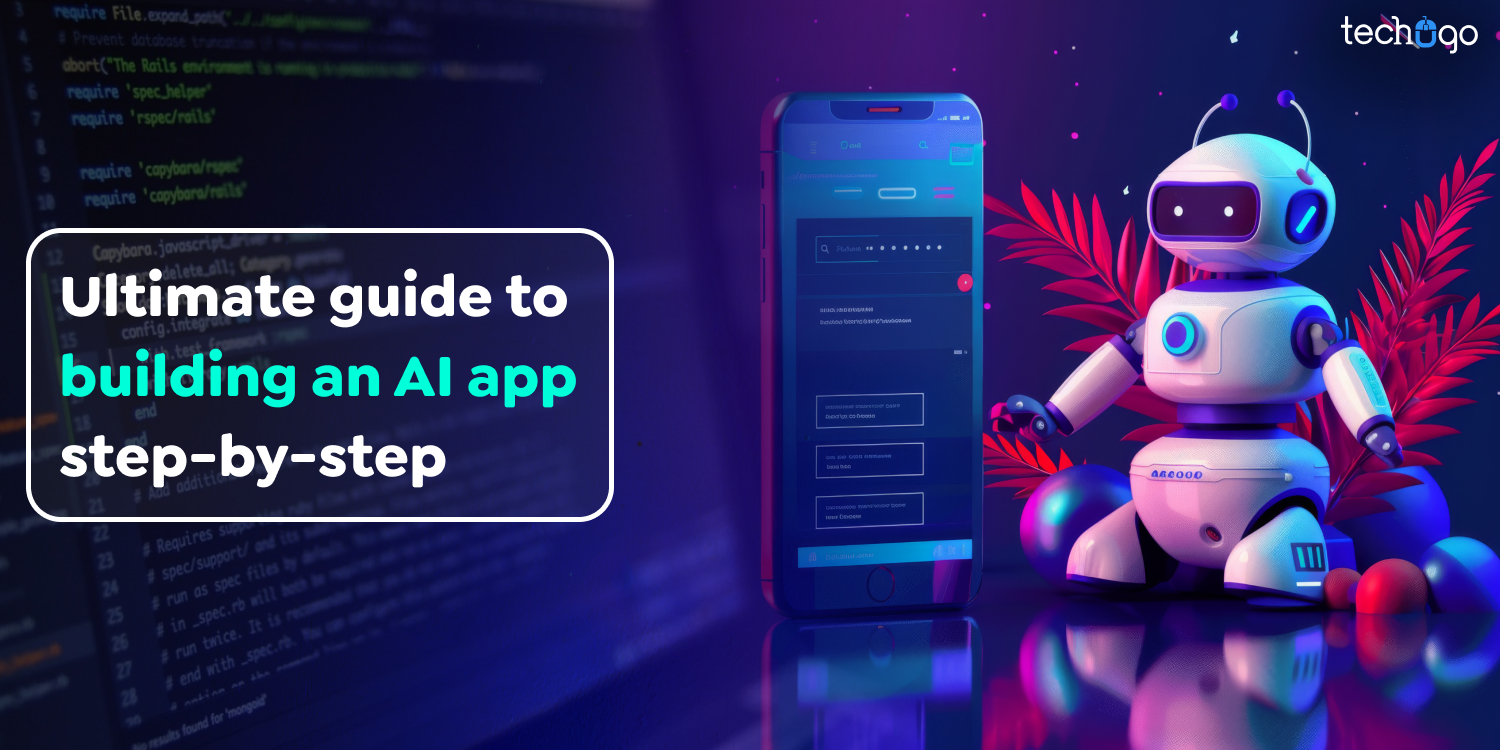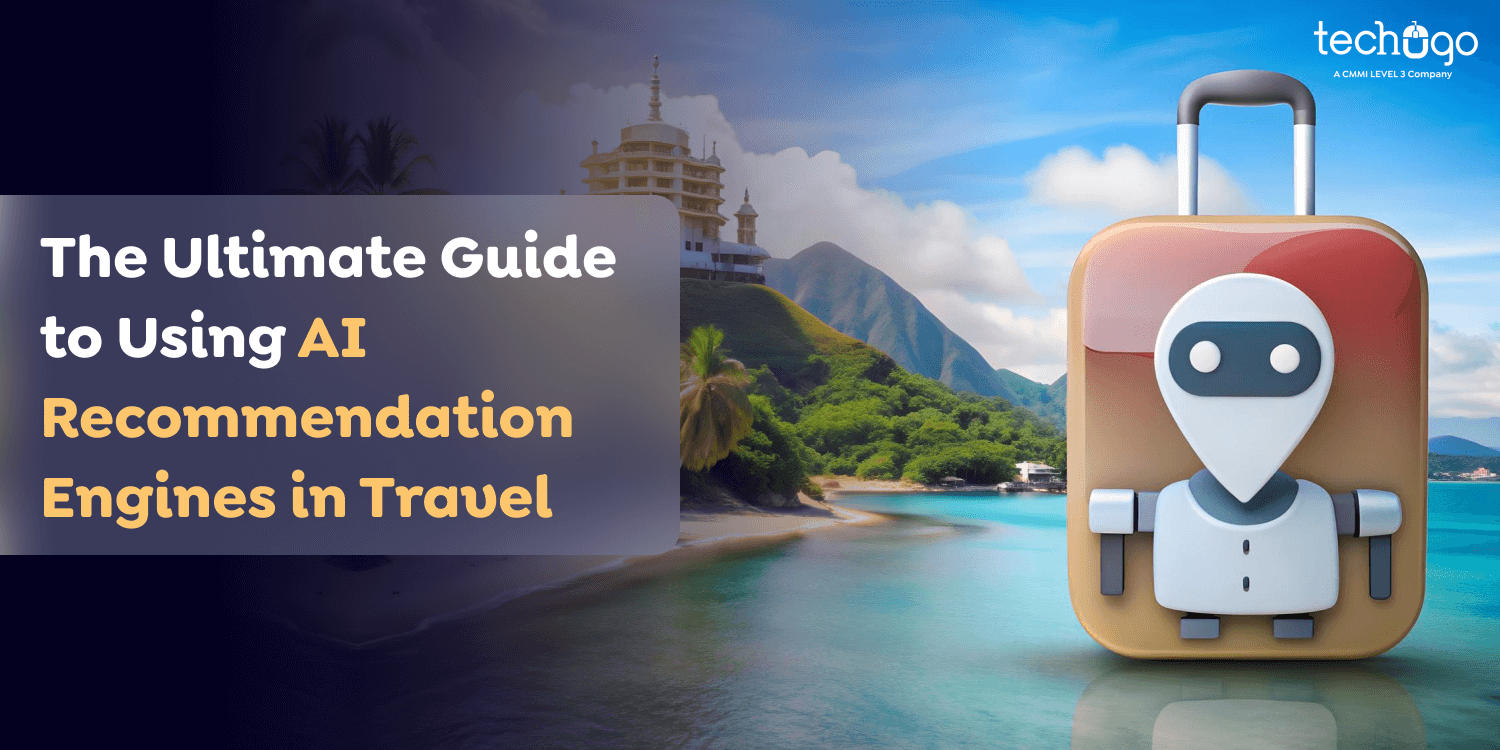29 Jul 2024
Updated on January 31st, 2025
AI in Mental Health: Discover the Challenges and Opportunities
Matthew Connor
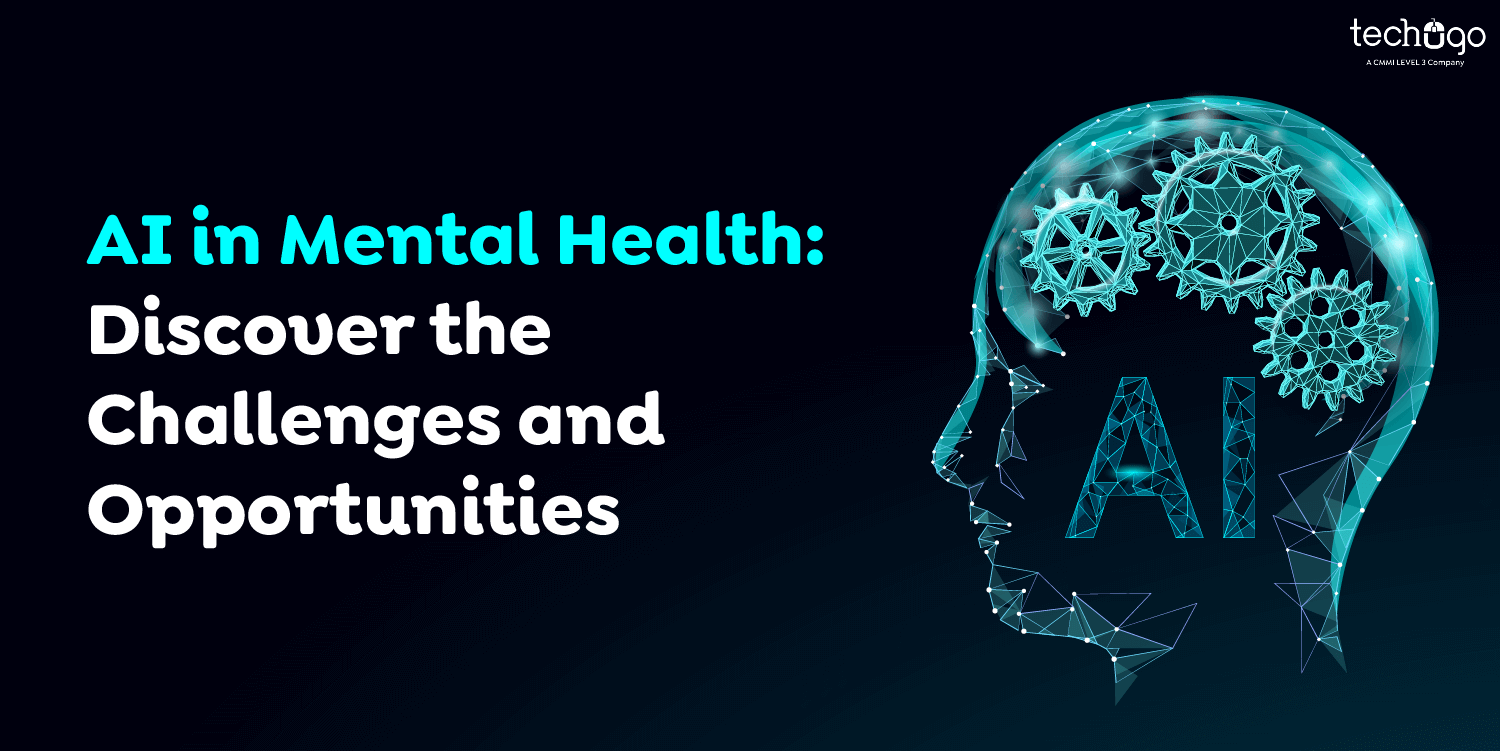
Artificial Intelligence has quickly emerged as an innovative solution in the healthcare sector for dealing with mental health problems. Society continues to acknowledge the significance of mental well-being as we demand solutions and innovative healthcare practices that offer long-term, efficient relief. AI in Mental Health offers such innovative and cost-effective solutions.
Artificial Intelligence can have a transformative impact on mental healthcare systems. AI’s main promise lies in improving diagnosis, treatment, and assistance – offering personalized and comprehensive services with modern algorithms & data analytics enhancing pattern detection & personalized interventions.
AI for mental well-being has emerged as one of the game-changing innovations offering rapid and tailored interventions by studying intricate data patterns to detect early indicators of mental health concerns. Integrating AI improves access while tailoring treatments to each patient’s needs for higher-quality and efficient care delivery. Harnessing this powerful technology creates an optimistic vision where cutting-edge tech and compassionate patient care work harmoniously to provide everyone with optimal mental well-being.
Opportunities of AI in Mental Health
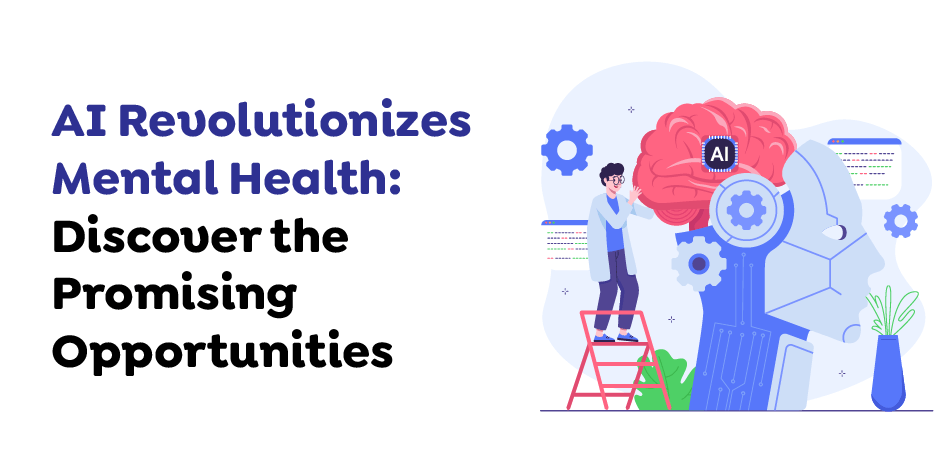
AI in mental health provides numerous possibilities to improve diagnosis, treatment, and accessibility to treatment. In addition, AI-driven platforms could offer individualized treatment plans and 24-hour support, making health treatment more accessible and adapted to the individual’s demands. Let’s take a look at the most lucrative opportunities available to AI in the mental health sector.
Early Detection and Diagnosis
AI could revolutionize the early detection and treatment of mental health disorders. ML algorithms can easily analyze huge amounts of data, such as medical documents, social media activities, and speech patterns, to detect early indicators of mental health problems. This technology allows for prompt intervention, which is essential to stopping the progression of mental illness.
For example, AI can easily detect subtle changes in someone’s voice or writing, which could indicate anxiety or depression. By identifying these signs in the early stages, healthcare sector professionals can offer assistance before the condition deteriorates. This proactive approach will significantly enhance the living quality of people in danger.
Personalized Treatment Plans
AI in mental health can help create customized treatment plans tailored to each patient’s requirements. By analyzing data from many sources, such as a person’s genetics, lifestyle, and treatment background, AI can recommend the most effective treatments for every patient. This individualized approach could result in better outcomes compared to standard one-size-fits-all therapies.
For example, AI can help identify which drugs are likely the most efficient for a specific patient based on their genetic profile and medical background. In addition, AI can monitor a patient’s progress and adjust treatments in real-time to ensure treatment is effective for a long time.
Improved Access to Mental Health Services
One of the major problems in the field of mental health is access. Many people don’t have access to services for mental health due to financial, geographical, or social limitations. AI can help to bridge the gap by offering accessible and affordable services for mental health.
AI-powered chatbots and virtual therapists can provide immediate help for those in need. These tools offer emotional help, coping strategies, or even cognitive behavioral therapy (CBT) activities. Although they’re not meant to replace human counselors, they could be useful for those who are not able to access traditional psychological health services.
Enhanced Monitoring and Support
AI will improve the monitoring and patient care of those suffering from mental health problems. Wearable devices and apps for smartphones equipped with AI algorithms will constantly monitor a person’s mental well-being. They can monitor metrics like sleep patterns, physical activity, and heartbeat, giving important information about a person’s overall health.
For example, an application could alert a patient when it notices indications of a possible relapse in their disease. This system of early warning allows prompt intervention and reduces the chance of serious episodes. In addition, these tools may provide specific guidelines to help individuals deal with their psychological health more effectively.
Advancement in Research
AI can dramatically enhance research in the field of mental health through the analysis of huge quantities of data quickly and with precision. Researchers can utilize AI to discover patterns and relationships that might not be evident through conventional research methods. This ability can provide fresh insights into the root nature and causes of mental health disorders.
For example, AI can analyze genetic information to discover biomarkers for mental health conditions. These biomarkers can be utilized to create new diagnostic tools and targeted treatments. Furthermore, AI can help researchers determine the effect of environmental influences on mental well-being, which can lead to more complete prevention strategies.
Cost-Effective Solutions
The application of AI in mental health services can result in affordable solutions. AI-powered tools could reduce the requirement for costly and time-consuming human intervention. For example, virtual therapists offer ongoing assistance at less than the cost of traditional therapy sessions.
Furthermore, AI can streamline administrative tasks, like scheduling appointments or keeping patient records. This efficiency enables healthcare professionals to focus on the patient’s care and less on paperwork, ultimately cutting overall expenses.
Support for Healthcare Providers
AI helps medical professionals in providing better care for their patients. AI-powered tools can assist medical professionals with diagnosing and treating mental problems by providing recommendations based on evidence. These tools can help medical professionals stay up-to-date with the most current research and best methods of mental health treatment.
For example, an AI system can evaluate patients’ symptoms and medical records to recommend treatments and diagnosis. This can aid clinicians in making better-informed decisions and enhance the quality of treatment offered to patients.
Real-Time Data Analysis
AI allows real-time data analysis, essential in monitoring and regulating mental health issues. Traditional analysis methods can take a long time and don’t provide immediate information. AI can process huge data sets in real-time, instantly detecting trends and problems.
For example, AI can analyze social media posts to detect trends in public mental health. Health professionals can use the information gathered to create specific interventions and campaigns. Data analysis in real-time can aid healthcare professionals in tracking treatments’ efficacy and making adjustments quickly.
Integration with Other Technologies
AI can be easily used with other emerging technologies to provide holistic treatments for patients’ mental well-being. For example, the combination of AI and virtual reality (VR) can result in therapeutic experiences that are immersive for patients. VR is a great way to create realistic scenarios, allowing patients to learn coping strategies in a safe setting.
Furthermore, AI can be integrated with telemedicine platforms for remote patient monitoring consultation and assistance. This integration could make mental health services more accessible for those who live in remote or underserved areas.
Enhanced Patient Engagement
AI can improve patients’ engagement by making mental health care more engaging and personal. AI-powered applications and tools can offer personalized interventions and content according to the patient’s preferences and requirements. Personalization can boost engagement and motivate patients, leading to improved results.
For example, an AI app could employ gamification methods to encourage users to take part in therapy exercises. By making the process more enjoyable, people tend to be more inclined to stick with their treatment regimens.
Predictive Analytics
Predictive analytics is a new opportunity created by AI in the field of mental health. By studying previous records, AI in mental health can predict the possibility of upcoming mental health problems. This information can be used to make proactive changes to reduce the chance of having severe episodes.
For example, AI can identify patterns in the behavior of a patient that could suggest a possibility of developing depression. Healthcare professionals can then take preventive measures, like making regular visits to check-ins or recommending lifestyle changes to lower the chance of developing depression.
Global Reach
AI is a promising technology that could increase the accessibility of mental health care worldwide. Many regions of the world do not have adequate mental health services only because of a lack of skilled experts. AI-powered tools can support those in these regions and help bridge the gap to access to mental health.
For example, the AI chatbot can offer basic mental health assistance and assistance to those living in remote locations. While they’re not a replacement for professional treatment, these tools can provide an important service to those who may not have access to mental health services.
Use Cases of AI in Mental Health
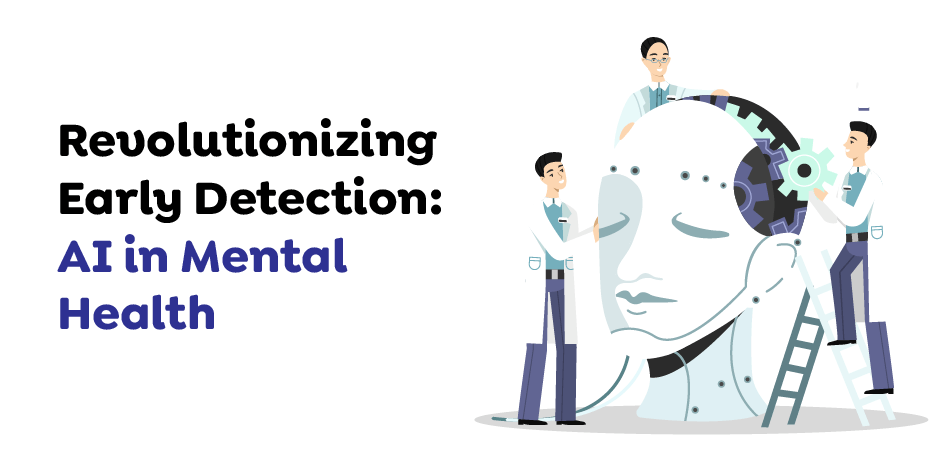
Artificial Intelligence (AI) is revolutionizing the mental health field by providing innovative solutions and developing apps for mental health. AI-powered applications offer many advantages, from early diagnosis to individualized treatment plans. Here are a few of the most significant use cases of AI in the field of mental health.
Personalized Therapy and Treatment
A personalized therapy program is one of AI’s most exciting applications in the mental health app development field. AI can evaluate a patient’s history, preferences, and reactions to different treatments and tailor an appropriate therapy program that meets each patient’s individual needs.
For example, an AI-powered application can suggest Cognitive-behavioral Therapy (CBT) exercises in response to a user’s performance and feedback. Through continuous learning from the user’s interactions, the app will adjust the treatment plan to increase its effectiveness.
Virtual Mental Health Assistants
Virtual mental health assistants, commonly known as chatbots, offer immediate assistance and support to users. The AI-powered assistants are available 24/7, providing a quick and easy solution for those in need.
A mental health app that includes a virtual assistant may help users manage anxiety, stress, and depression by offering coping strategies and emotional assistance. Although they are not a substitute for therapy from a professional, they can be an excellent source for those who require immediate or continuous assistance.
Remote Monitoring and Support
AI can allow remote patient monitoring of a patient’s health conditions, making it much easier to provide constant assistance. Wearable devices and smartphone apps can monitor users’ physical and mental health indicators, including sleeping patterns, levels of activity, and mood.
For example, a mental health app could use AI to analyze data collected from a wearable device to identify signs of sleep disturbances related to mental health problems. The app would then provide individualized recommendations to improve the quality of sleep, including relaxation techniques or other sleep hygiene suggestions.
Enhancing Traditional Therapy
AI in mental health can help improve therapy by giving therapists more tools and information. For example, AI can analyze session transcripts and identify patterns, then suggest areas to explore further.
A mental health app can record and transcribe therapy sessions and allow the AI to pinpoint the most important topics and issues that are frequently discussed. This information can help therapists comprehend their patients and adjust their treatment accordingly.
Predictive Analytics for Mental Health
Predictive analytics is a potent application of AI in mental health treatment. By studying past information, AI can predict future mental health outcomes and also identify people at risk of developing mental illness.
An AI-powered mental health app can examine the user’s information to determine the likelihood of experiencing a depressive episode. If risk levels are significant, the app will inform the user and their healthcare doctor, allowing the taking of preventive measures.
Reducing Stigma and Encouraging Help-Seeking Behavior
AI can alleviate the stigma that surrounds mental health issues through the normalization of using advanced technologies to provide support for mental health. The apps for mental health offer the ability to be discreet and easy for individuals to seek support.
An AI-based app could provide anonymous support by allowing users to talk about their mental health issues without fear of judgement. This can make it easier for people to seek help, particularly those who would be hesitant to seek help in a conventional setting.
Providing Education and Resources
Mental health applications powered by AI may give users valuable advice and information. They can provide information about various mental health issues treatments, as well as strategies for coping.
For example, a mental health app could use AI to create custom-designed content for its users based on their preferences and needs. This approach ensures that users receive pertinent and useful information.
Facilitating Peer Support
AI can help with peer support by connecting people who have similar experiences. Mental health apps use AI to connect users according to their preferences, needs, and conditions.
A good example is how an AI-powered application can help create support groups for people suffering from anxiety, allowing people to share their stories and support each other. This community-building experience is extremely beneficial to people suffering from mental health problems.
Enhancing Crisis Intervention
AI can play an important role in crisis intervention by offering immediate assistance to those in need. Apps for mental health can utilize AI to identify warning signs of crisis and provide assistance in real-time.
For example, an AI-based application can look at a user’s behavior and speak for indications of suicidal inclinations. If the app detects signs of suicidal ideation, it can offer immediate help, like contact details for emergency hotlines or crisis services.
Supporting Mental Health in the Workplace
AI can help improve mental health and well-being by giving employees tools to reduce stress and ensure their well-being. Apps for mental health can provide specific support and resources to employees, making it easier to keep their health and productivity high.
For example, an app for mental health could use AI to assess an employee’s stress level and give suggestions on managing stress. This proactive approach will help to stop burnout and increase the overall well-being of employees.
Integration with Other Health Technologies
AI can integrate with health technology to offer holistic treatment for mental health. Mental health apps can be connected to EHRs, electronic health records (EHRs), wearable devices, and other health apps to provide a complete picture of patients’ health.
An AI-powered mental health application can draw data from an EHR to give an accurate picture of a patient’s medical history. This integration can lead to more precise diagnoses and individualized treatment plans.
Enhancing Research and Development
AI can aid in the research process and develop in the field of mental health by studying large data sets to find patterns and correlations. This ability could provide new insights and breakthroughs on the subject.
For example, the mental health app could collect and analyze users’ data to discover common characteristics associated with specific mental health disorders. This data can be utilized to create new therapies and treatments.
Improving Accessibility to Mental Health Services
AI will increase access to mental health facilities by providing accessible and affordable alternatives. Apps for mental health can assist those who cannot access traditional services due to financial or geographical obstacles.
For example, an AI-based app could offer video sessions for therapy, which makes it much easier for people in remote locations to receive treatment for mental illness. This accessibility will aid in the fight against the global deficiency of mental health specialists.
Encouraging Self-Management
AI can help users manage their mental health by offering tools and resources to monitor and improve their overall health. Health apps for mental health may provide specific recommendations and can track changes over time.
For example, an AI-powered application can aid users in setting and reaching goals for mental health, such as practicing mindfulness or increasing their exercise. By empowering users to manage their mental health, these apps may improve their health and well-being.
Supporting Family and Caregivers
AI helps caregivers and family members of those suffering from mental health problems by providing them with tools and advice. The apps for mental health can provide information and tools that can help caregivers deal with those who are ill with their illnesses.
For example, AI-powered apps can give caregivers tips about how to help people suffering from anxiety or depression. This can help improve the level of service offered and ease caregivers’ burden.
Challenges of AI in Mental Health
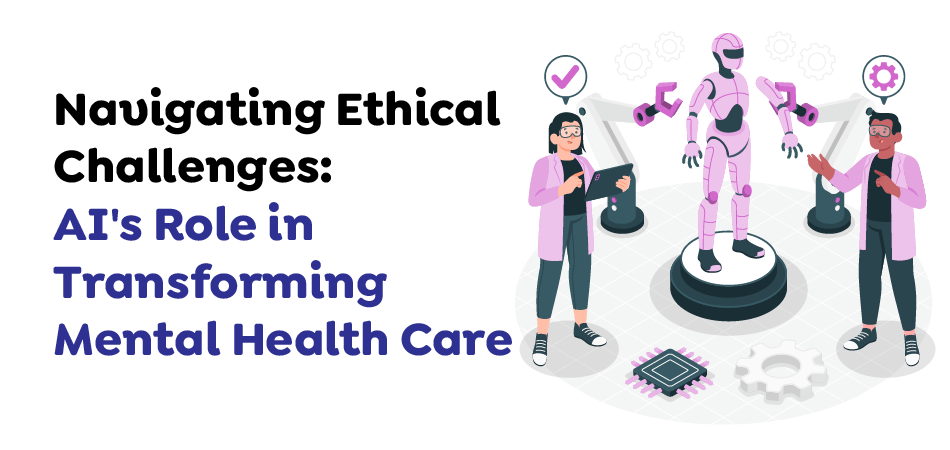
Although AI has enormous potential for the field of mental health, it does come with a number of issues. These challenges must be overcome to ensure a safe and ethical implementation. Understanding these challenges is vital when considering how to develop a mental health app. Here are a few major challenges faced by AI in the field of mental health.
Data Privacy and Security
One of the most difficult issues for AI or mental health care is protecting data privacy and security. Mental health apps often need access to sensitive personal data such as medical histories and behavioral information, and it is crucial to protect this information from unauthorized access.
When creating an app for mental health, strong security measures are vital. These include secure data storage and strict access control. Ensuring compliance with things like GDPR and HIPAA is essential to secure users’ data.
Ethical Concerns
Ethics are a further major problem. AI systems may make decisions that are hard to comprehend or explain. This absence of transparency, also known as” the black box” problem, is a major issue in mental health care.
To combat this, developers must prioritize transparency and accountability when developing AI systems. It is crucial to explain clearly how AI makes its decisions and ensure that the decisions are founded on ethical standards. Developers must also include mental health experts during the design process to ensure that ethical concerns are properly considered.
Bias and Fairness
AI systems may exhibit biases, leading to discrimination against certain groups. The bias may be rooted in the data used to build the AI model or could reflect existing societal biases.
To avoid this problem, AI healthcare app development companies must use varied and representative data sources. Continuously examining AI systems for bias and making the necessary adjustments can help ensure the system’s fairness. Incorporating diverse perspectives into the development process will further lower the chance of bias.
Limited Access to Quality Data
AI systems require huge quantities of high-quality information to perform efficiently. However, accessing these data is a challenge for those with mental health issues. Security concerns regarding privacy and the sensitive nature of mental health information could limit data access.
Developers should consider partnering with mental health institutions to gain access to anonymized data. Inviting users to provide their data per the appropriate consent could also aid in creating complete datasets while protecting privacy.
Integration with Existing Systems
Integrating AI-powered apps for mental health in existing healthcare systems may be challenging. Many healthcare facilities use outdated technology that might not easily integrate with the latest AI technology.
Developers must design mental health applications with various healthcare systems to address this issue. Offering thorough documentation and support for integration can help healthcare professionals use AI solutions.
Ensuring Accuracy and Reliability
The reliability and accuracy of Artificial Intelligence systems are crucial to mental health. Inaccurate or insecure AI predictions could lead to wrong diagnoses or incorrect treatment and harm patients.
Developers must rigorously test AI models to confirm their accuracy and dependability. Continuous updates and monitoring can help maintain AI models’ efficiency. Participating mental health professionals in the validation process could increase the security of AI systems.
User Acceptance and Trust
Gaining trust and acceptance from users is a major challenge for apps powered by AI to improve mental health. Some users may be skeptical of AI’s efficacy or are concerned about security and privacy.
To increase trust in their designs, developers must focus on user-friendly designs with transparent communication. Making users aware of the way AI functions and the value it can bring can help increase acceptance. Providing secure security and privacy features can also increase trust among users.
Regulatory and Legal Issues
Dealing with legal and regulatory challenges is another issue with the use of AI in mental health. Different regions have different rules regarding the privacy of data in medical devices and AI technology.
Developers need to be aware of pertinent regulations and ensure compliance. Navigating complicated regulatory landscapes might require collaboration with legal experts.
Cost and Resource Constraints
Making and maintaining apps for mental health using AI could be expensive. This includes the cost of data acquisition, development of systems testing, and ongoing maintenance.
To overcome cost-constrained issues, developers should consider financing opportunities through government grants, private investors, and partnerships with healthcare providers. Focusing on cost-effective solutions and leveraging open-source software can also help reduce expenses.
Technical Challenges
Technical challenges, like ensuring interoperability, scalability, and robustness, could slow AI’s progress in mental health. These problems require careful planning and execution.
Developers should concentrate on creating robust and scalable AI systems that can handle different workloads. Interoperability with other health technology and systems is essential. Utilizing the best techniques in software and AI development can help address these technical hurdles.
Why Choose Techugo for Transformative AI Solutions in Mental Health Care
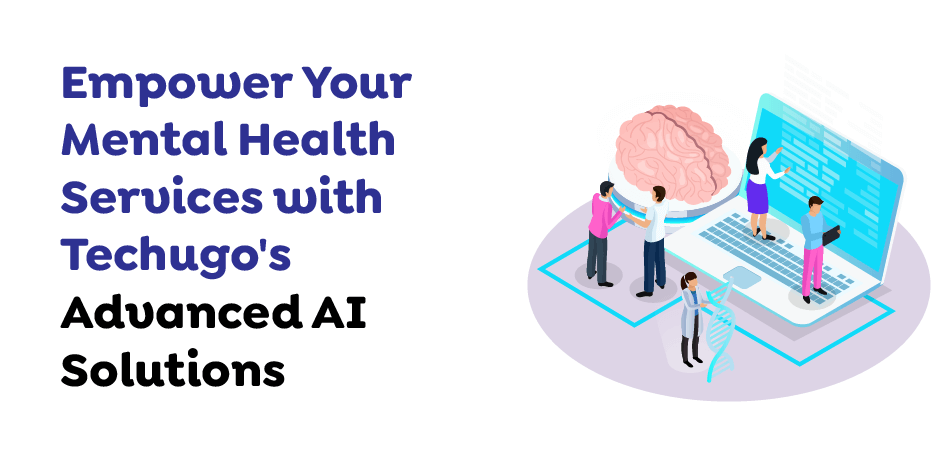
Partnering with Techugo can be beneficial for organizations looking to leverage cutting-edge technology solutions, particularly in sectors like mental health. Techugo, an app development company in Canada presents expertise in developing AI-powered applications that can change mental health care by delivering personalized treatments, improving early detection capabilities, and enhancing accessibility to services. Their ability to integrate AI with empathy-driven solutions guarantees that technological innovations are deployed ethically and effectively, handling challenges such as bias and data privacy. Collaborating with Techugo promises to bring scalable, robust, and regulatory-compliant AI solutions that can change mental health care delivery, making it more efficient, convenient, and patient-centric.
The Key Takeaway
AI in mental health offers a great opportunity to improve the quality of patients’ mental health. It provides personalized care that is accessible to everyone around the world and proactive support. It envisions an era where technology and empathy work together to improve mental health. With AI, mental health services can be customized to meet individual requirements, overcoming geographical barriers and ensuring that care is individualized, proactive, and accessible.
Artificial Intelligence has the potential to improve the quality of mental health care. It can provide personalized treatments that are accessible to everyone around the world, as well as proactive care, imagining the future in which technology and empathy are used together to improve mental health. Through the integration of AI with empathy, we can develop an easier and more efficient healthcare system for mental health.
The introduction of AI in the mental health field provides a wealth of opportunities for improving the early detection of problems and individualized treatment and access. However, it also poses important challenges, such as ethical issues, bias, and the necessity of regulation. In addressing these issues and pursuing a cooperative and ethically sound implementation, AI could become a useful tool for improving the quality of mental health care and helping those in need.
Get in touch with us today to build an AI app for mental health!
Get In touch
We are excited to here from you and let’s start something special Together. Call Us for any inquiry.
Write us
sales@techugo.caJust a call away
About you

